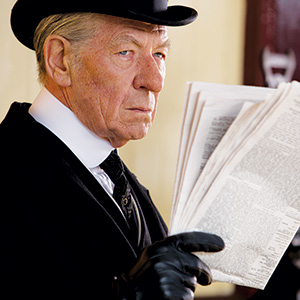

Mr. Sherlock Holmes is opposed by an ultimate foe—old age—in one struggle he cannot win. Based on Mitch Cullin’s novel, A Slight Trick of the Mind, the new Bill Condon film, Mr. Holmes, brings the director and Ian McKellen together for the first time since Gods and Monsters (1998).
Set in 1947, it tells of Holmes’ retirement in the country as a beekeeper. He’s tended by an impatient cook, Mrs. Munro (Laura Linney, with a feather-light English accent), and her brainy, fatherless son, Roger (Milo Parker). Holmes’ cottage is an easy walk from the White Cliffs; the aftermath of the war is symbolized by the wing of a wrecked German plane, still sticking out of the ground where it crashed.
He’s just returned from an arduous trip to Japan with some foul Japanese root called “prickly ash” that may fight the coming of senility. He turns his waning faculties on two final cases. One is the question of what is killing his bees. The second is a true account of his last client, in events that happened three decades before—a story already fictionalized and given a happy ending by Dr. Watson. Holmes cannot recall the real outcome, despite certain sharp memories of a lady’s gray glove and the trilling of a glass harmonica.
McKellen is 76, and he’s very hale in the 1920s flashbacks. He swings his walking stick with brio; these scenes alternate with his present-day Holmes—blank and ape-like, as the vacancy of mind strikes him. This is an acute, bravely unsentimental portrait of decay, and it’s as tough to watch as it is impossible to turn away from.
The tale is thickened with red herrings mostly having to do with the Japanese voyage, where Holmes literally sifts the ashes of the war. When you see Holmes’ name you expect adventure and danger, not a memory piece, and so there’s something a little disconcerting about Mr. Holmes. Still, it’s a touching and elegant film, with a deep, pellucid poignancy softened by Carter Burwell’s soundtrack. There’s nothing pandering about McKellen’s foxy yet affecting performances, both as the sage in his ’60s, who fails to see a clue in plain sight, and the nonagenarian recluse with a crumbling mind.
PG; 105 Mins.



